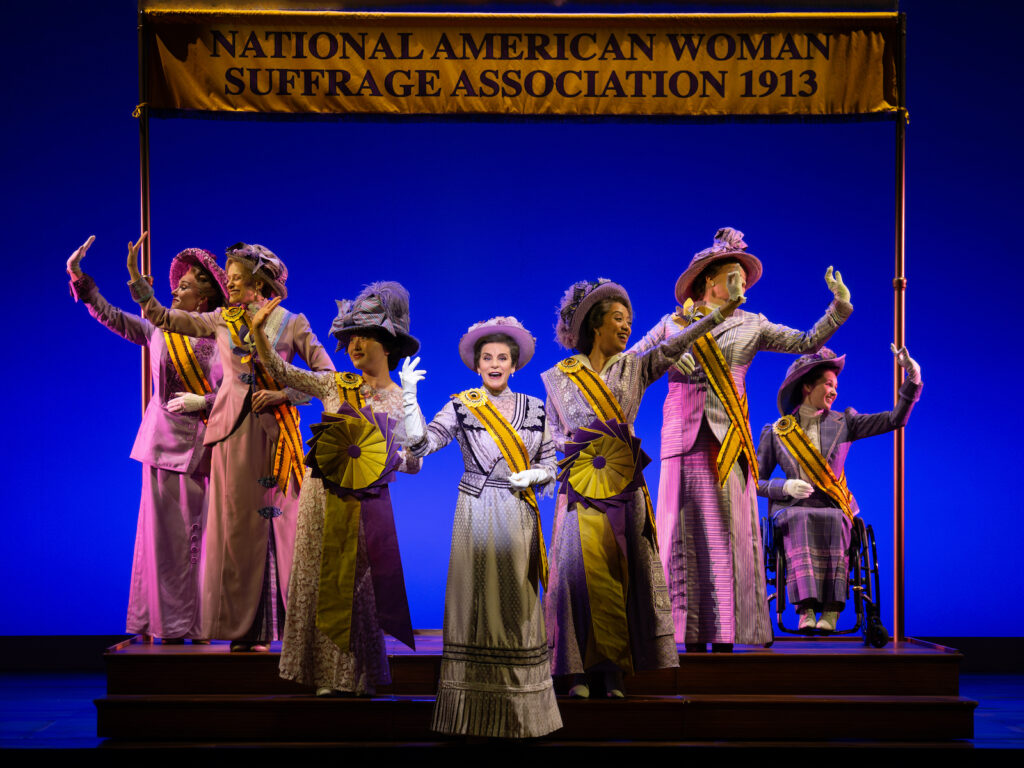Broadway, which is frequently praised as a stronghold of artistic expression and cultural analysis, was thrown into controversy once more when the Tony-winning musical “Suffs” was interrupted. This episode, in which demonstrators called for the performance to be canceled and accused the artist of whitewashing a historical performance, brought to light deeper tensions regarding historical narratives, feminist representation, and the role that art has in addressing social justice issues.
Shaina Taub’s “Suffs,” which was praised for its examination of the suffragist movement, was called “a White Wash” by protestors—a banner they unfurled. The demonstration, which was organized by a group calling itself “radical, anti-racist, queer feminists,” highlights current discussions concerning inclusivity and historical accuracy in feminist communities. Their criticism centers on how the musical depicts feminism; they contend that it ignores the perspectives and contributions of non-white suffragists, perpetuating what they refer to as “rehashed white feminism.”
The “Suffs” producers, which include well-known individuals such as Hillary Clinton, have expressed their concern about the protesters’ concerns but have refrained from addressing the demonstrators’ specific complaints. Rather, the musical itself addresses racism within the suffragist movement and emphasizes Black women’s crucial contributions to the struggle for the right to vote. This storyline’s nuanced approach implies a conscious attempt to engage with intricate historical realities while delivering a story that appeals to modern audiences.
After a climate activist group disrupted “An Enemy of the People,” a Broadway show has been disrupted twice in as many months: the incident at the Music Box Theatre. These incidents highlight a developing pattern in which theaters are being used as platforms for activism, forcing both viewers and artists to face hard realities and reevaluate stories from a critical perspective.
Broadway has long struggled with issues of authenticity and representation as a forum for cultural dialogue. The interruption of “Suffs” serves as a reminder of the power relationships that exist in the arts, where social responsibility and artistic freedom collide. Critics contend that although art ought to elicit contemplation and conversation, it also needs to balance historical accuracy and sensitivities, particularly when portraying movements as important as women’s suffrage.
Furthermore, the demonstration against “Suffs” calls into question the narratives that are told and by whom. Our narratives must adapt to reflect the diversity and complexity of human experiences as society does. Achieving a balance between promoting marginalized voices, honoring historical truths, and involving audiences in thought-provoking conversation is the task facing Broadway and other similar artistic venues.
In conclusion, the cancellation of “Suffs” highlights the continuous conflicts that exist between representation, activism, and the arts, but it also offers a chance for introspection and discussion among theatergoers and the general public. The lasting impact of “Suffs” may come from its Tony Awards and its ability to spark larger discussions about inclusivity, authenticity, and the influence of storytelling on how we understand history and identity as a society, as Broadway continues to work through these complex issues.
